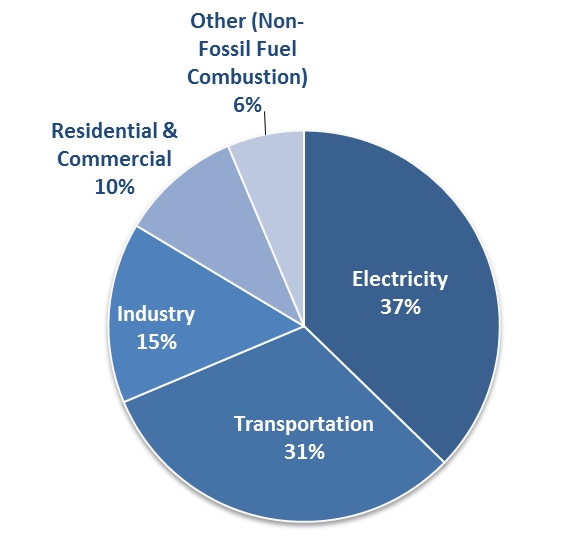The 'Show Me State' nixed a 780-mile high voltage transmission line to carry wind energy generated in western Kansas through Missouri to Indiana, where it would transmitted to the East Coast.

More renewable energy will be necessary to meet federal and state air quality and climate goals and reduce reliance on polluting fossil fuel power plants, the largest source of carbon emissions in the United States. But it's not just a question of producing clean energy—it needs to be transmitted as well.

Note: All emission estimates from the Inventory of U.S. Greenhouse Gas Emissions and Sinks: 1990-2014.
Credit: Environmental Protection Agency — Overview of Greenhouse Gases
Wind energy, supplying 35 percent of the nation's supply of renewable energy for electricity generation, is second only to hydropower, according to the Energy Information Administration. It supplies seven times the amount of energy of solar power. [See EIA image.]
One of the main impediments to increasing wind energy is that energy sources are located far from population centers, thus transmission lines are critical to increasing the spread of this zero-emission energy.
According to the project's website, "the Grain Belt Express Clean Line will deliver approximately 4,000 megawatts of low-cost wind power from western Kansas to Missouri, Illinois, Indiana and neighboring states that have strong demand for clean, reliable energy."
The Associated Press reports that the company, Clean Line Energy Partners, has received approvals in Kansas, Illinois, and Indiana.
Opposition
What's holding it up the line is approval from the Missouri Public Service Commission, influenced by project opponents Block Grain Belt Express, a "grass-roots organization that powered the effort that led to the project’s rejection last summer," writes Jodie Jackson Jr. for the Columbia Daily Tribune.
Missouri’s Public Service Commission denied Houston-based Clean Line a certificate of convenience and necessity last July on grounds the line would not benefit the state’s consumers and landowners. Attempts to have the commission reconsider the ruling failed in August, and it closed the case in October.
As is often the case in big infrastructure projects, what has the opponents riled up is the possibility of the use of eminent domain, as a June 5 Facebook posting makes clear.
Grain Belt Express Clean Line, a private for-profit company from Houston, TX, is proposing to run a high voltage direct current transmission line through your county and, quite possibly, through your land and near your home! They will try to do this by becoming a public utility in Missouri and therefore having the power of EMINENT DOMAIN....
Refiling application
"Mark Lawlor, director of development with Clean Line, said [June 20] the company has been 'actively developing the project' and intends to refile its application with the commission 'in the coming weeks'," adds Jackson Jr.
Already it can be shown that the project will benefit the state's electricity consumers.
The "Missouri Joint Municipal Electric Utility Commission (MJMEUC) approved a proposal to increase the public power agency’s renewable energy supply by purchasing long term transmission service on the Grain Belt Express Clean Line (Grain Belt Express) transmission project," according to a on June 3 press release [PDF].
The agreement between the Grain Belt Express and MJMEUC, a public power agency that serves 67 municipalities throughout Missouri, is expected to save Missouri municipal ratepayers at least $10 million annually when the project becomes operational, according to an analysis performed by MJMEUC.
"The Missouri Chamber of Commerce and Industry endorsed the Grain Belt project on [June 20], citing a bevy of potential economic benefits the transmission line project would offer the state," adds Jackson Jr.
But the opposition is gearing up for the battle.
“People are determined — they’re fired up,” said Jennifer Gatrel, spokeswoman for Block Grain Belt Express. The first two of several scheduled public meetings to rally support have raised $18,000.
Hat tip to Eric Wolff, energy reporter for POLITICO Morning Energy.
FULL STORY: Wind power project prepares for second round

Planetizen Federal Action Tracker
A weekly monitor of how Trump’s orders and actions are impacting planners and planning in America.

Chicago’s Ghost Rails
Just beneath the surface of the modern city lie the remnants of its expansive early 20th-century streetcar system.

Amtrak Cutting Jobs, Funding to High-Speed Rail
The agency plans to cut 10 percent of its workforce and has confirmed it will not fund new high-speed rail projects.

The French Solution to Congested Tunnels: Make Them Car-Free
Bay Area transportation officials keep expanding car capacity. Lyon’s Croix Rousse Tunnel offers a different way.

Missouri Governor Reverses Anti-Discrimination Housing Policies
A new state law bars cities from prohibiting source-of-income discrimination against tenants using Section 8 housing vouchers.

USDOT Launches Unfunded 'SAFE ROADS' Program
The program targets “distractions” and “political messages or artwork,” and paves the way for autonomous vehicles.
Urban Design for Planners 1: Software Tools
This six-course series explores essential urban design concepts using open source software and equips planners with the tools they need to participate fully in the urban design process.
Planning for Universal Design
Learn the tools for implementing Universal Design in planning regulations.
City of Fort Worth
planning NEXT
Mpact (founded as Rail~Volution)
City of Camden Redevelopment Agency
City of Astoria
City of Portland
City of Laramie




























